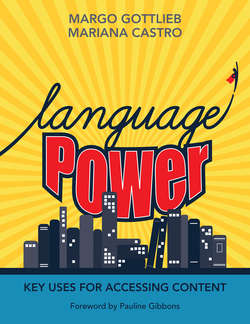Читать книгу Language Power - Margo Gottlieb - Страница 7
На сайте Литреса книга снята с продажи.
ОглавлениеForeword
Margo Gottlieb and Mariana Castro have chosen some challenging and inspirational words to begin the final chapter of this thoughtful, carefully designed, and practical book. Drawing the reader’s attention to some of the major challenges for teachers, they include these words from the work of Barnett Berry (2016):
It is time for America’s young people—all of them, not just a privileged few—to take part in deeper learning. And it is time for policymakers and practitioners to create the system of teacher leadership for them to do so.
Few educators would disagree with these words. Ongoing research has shown that students from all backgrounds are more engaged in learning, and achieve at higher levels, when they have opportunities to participate in a cognitively challenging curriculum and the kind of “deeper learning” to which Berry refers.
School success therefore also depends largely on a student’s ability to control disciplinary and subject-specific language, and to participate in the higher-level thinking that this language makes possible.
The development of academic language is of particular relevance to students who are English language learners (ELLs). While most ELLs quickly develop the “everyday” language used in informal contexts, such as the language used between peers in the playground, this kind of informal language is very different from the academic language needed for learning across the curriculum in school. Without specific and targeted language support in all subjects, ELLs may not develop the tools for subject learning, and so are unable to participate fully in school. This is also true for many other students, (including those who speak nonstandard varieties of English, or those who, in the words of Berry, are not the “privileged few”). Indeed, for almost all students, subject-specific discourses represent less familiar ways of using language.
Ultimately, therefore, if learners are not to be disadvantaged in their long-term learning, and are to have the time and opportunity to learn the subject-specific discourses of school, all subject learning needs to be integrated with the teaching of academic language, along with the recognition by all teachers that they are teachers of language, not simply of subject “content.” Without this focus on language, schools cannot provide education that leads to equitable outcomes.
The challenge for teachers and school leaders, therefore, is how to plan a curriculum that integrates subject learning with related academic language, and how to provide the appropriate language support that will enable all students to develop the essential academic and subject-based language for learning across the curriculum. Margo Gottlieb and Mariana Castro have taken up that challenge in this book. Language Power focuses on the key uses of academic language, demonstrates how these uses can be integrated, assessed, and implemented, and suggests ways to involve and collaborate with the broader school community. The book is aimed primarily at practitioners and educators in the field and provides not only theoretical frameworks for teachers, teacher leaders, and other professionals to think about their own professional work, but also a wealth of practical ideas, teacher tools, and language-centered resources for use in the classroom. These resources are based on the assumption that all language development involves a continuing process of meaning making; that academic language is best learned in the context of actually using it for authentic purposes across the curriculum; and that teachers themselves need time and support for their own professional learning. These are important messages not only for classroom-based teachers but also for teacher leaders and administrators.
Language Power urges teachers and other professional educators to “reenvision” teaching and, through a better understanding of the role that academic language plays in learning and school assessment, to see it as more than the teaching of subject content. Using interactive activities to stimulate in-depth conversations between teachers, the authors suggest a process for reflecting on teaching in new ways. Central to this reflection is a conceptual tool they refer to as DARE (discuss, argue, recount, and explain). DARE is used in many contexts throughout the book, and through these reflections teachers are able to not only increase their own understanding of the nature of academic language but also understand how this tool can be used with their students in all areas of the curriculum.
This thought-provoking and very practical book will be welcomed by all educators who are striving to provide a more equitable curriculum for students. As the book suggests, this endeavor requires classroom teachers to think critically about the language they use with students, and develop the knowledge and skills to provide students with explicit and well-planned support for the development of academic language. Language Power will assist educators in making these endeavors a reality.
—Pauline Gibbons
Author of Scaffolding Language, Scaffolding Learning, Second Edition and Associate Professor, University of New South Wales, Sydney, Australia
Reference
Berry, B. (2016). Teacher leadership and deeper learning for all students. Center for Teaching Quality. Retrieved from http://www.teachingquality.org/deeperlearning.
